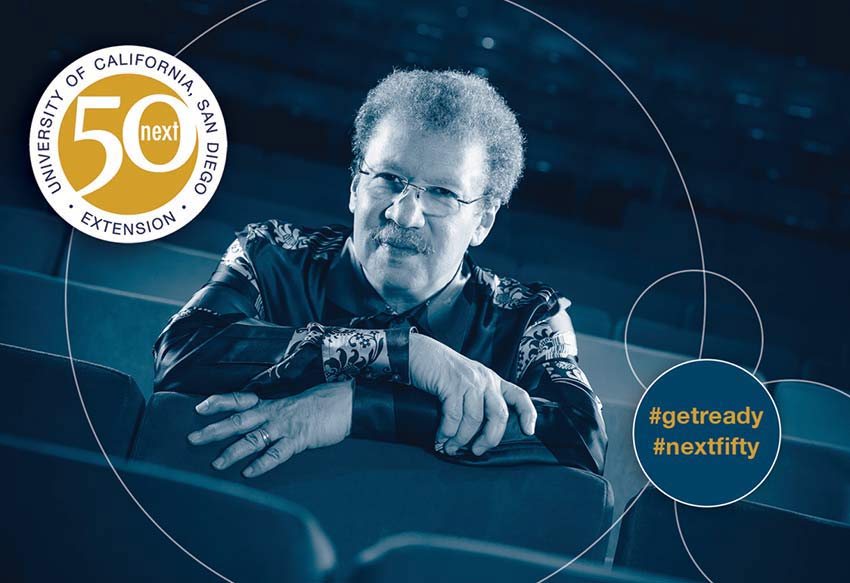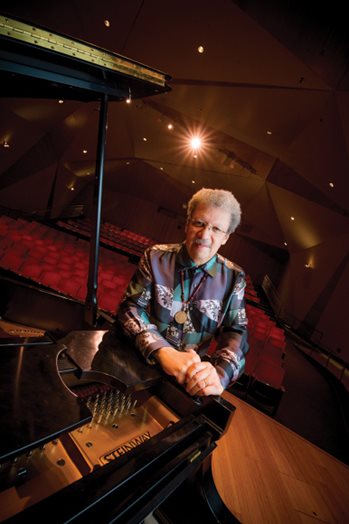6 December 2016
50 Voices of the Future: Anthony Davis on musical innovation

In honor of UC San Diego Extension’s first 50 years, 50 Voices of the Future asks thought leaders about the trends, breakthroughs and social advances they foresee over the next 50 years.
Anthony Davis’ cutting-edge operas exude all the drama and power of the art form, while exploring relevant and often charged topics. At UC San Diego, the celebrated composer/pianist is a music professor in Integrative Studies and Composition. His eight operas (he is working on his ninth) include “X, The Life and Times of Malcolm X,” “Five” (about New York’s Central Park Five) and “Wakonda’s Dream,” (about a resilient Native American family). “Lear on the Second Floor,” which premiered at UC San Diego in 2013, is one of his several smaller-scale operatic works.
Davis also writes chamber, choral and orchestral music and leads workshops for the New York-based American Composers Orchestra. He frequently tours as a solo pianist, especially in Europe, and recently performed with acclaimed jazz trumpeter Wadada Leo Smith, his longtime musical compadre. Davis’ collaborators at UC San Diego include playwright Allan Havis and contrabassist Mark Dresser, both fellow professors. Davis has been a music instructor at UC San Diego’s Jazz Camp since it began 15 years ago. He calls the camp a “wonderful experience.”
(1) Why is the work you do important?
My work, particularly in opera, has transformed the medium by creating pieces with political impact and synthesizing different traditions. I’m integrating jazz, classical and longer, extended forms. How I approach text and setting words to music is part of my innovation as composer.
Taking on politically charged issues is an important role that opera can play. My colleagues and I are working to make opera immediate and visceral, to create a different intimacy than grand opera.
(2) What are the influential/exciting developments happening in your field now and why?
One is the use of electronic media, using computers to merge sound effects with music. With synthesizers, we can create a sound world that affects the audience before the baton drops.
There are other innovative forms of storytelling – taking the linear approach out of it and looking at issues from various points of views. Rap and hip hop have influenced the way we approach rhythm and text. We are bringing improvisation into opera.
 (3) What’s the next big thing?
(3) What’s the next big thing?
I’m interested in the idea of creating opera using telematics, which enables performers to collaborate in several locations at once. It’s not just the theatrical event but also includes using video projection. Pieces can be presented simultaneously allowing multiple perspectives.
(4) How big an impact will your field play in shaping the future of the San Diego region and beyond?
I don’t think it’s regional, although San Diego is emerging as a cultural center. The work I do looks at the country and the world. Nothing is limited to region now. What happens here happens around the world.
The work we do is very important in this hostile political environment. There’s a threat to our democracy. As artists, what we create sounds an alarm against oppression.
I worry that there will be assaults on the advancements that have been made over the last 20 years. We are looking at a period of great turmoil and ugly confrontations. As artists, we can galvanize people and help them realize what is at stake.
(5) Hop into your time machine…what does the future look like for this field in 50 years? How can individuals/companies get prepared for what’s next?
Who knows? It’s all up for grabs. If we are going to surrender to racist, misogynist forces within our society, we could get pessimistic. The stakes are high. In 50 years, we could be an open society welcoming ideas from people with different backgrounds or a repressive society that has reverted to our awful past. It’s not a given that in 50 years we will be in a better place than we are now.
UCSD Jazz Camp is a five-day summer program designed for intermediate to advanced level jazz musicians, ages 14–adult. UC San Diego Extension also offers a variety of Performing Arts courses in Singing, Guitar, Piano and more, for adults.